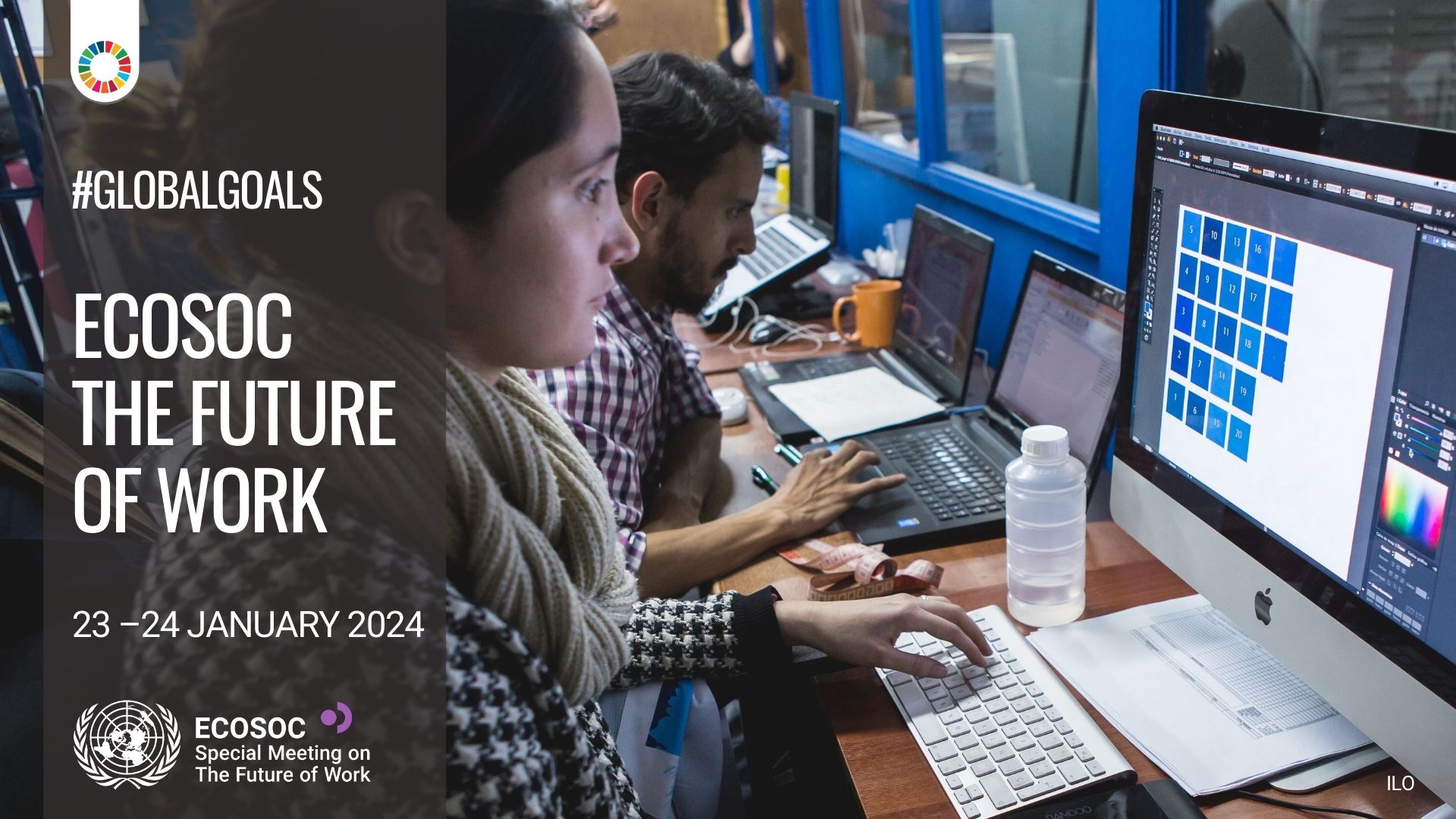UN ECOSOC Calls for International Cooperation and Joint Efforts to Foster Decent Work and Fulfillment of the 2030 Agenda
For the second time in its history, one of the United Nations’ most important organs is holding a Special Meeting at ECLAC’s headquarters in Santiago, Chile, on the topic of “The future of work: towards a productive, inclusive and sustainable global society.”

The highest authorities of the United Nations Economic and Social Council (ECOSOC) called today for intensifying international cooperation and joint work at a time of great global uncertainty, during a Special Meeting that is taking place in Santiago, Chile at the central headquarters of the Economic Commission for Latin America and the Caribbean (ECLAC).
This is the second time in 73 years that this important UN body has held a session in Chile. The first instance was in 1951, under Chile’s ECOSOC presidency and thanks to the efforts of Chilean Ambassador Hernán Santa Cruz, when the organization’s twelfth session was held in Santiago. That was the first time in United Nations history that one of its main organs convened outside official headquarters (New York) in a developing country.
Today, in 2024, and under the banner of “The future of work: towards a productive, inclusive and sustainable global society”, ECOSOC and its presidency – held again by the Government of Chile – decided to move this Council meeting from New York and bring it once again to the South, with the aim of ensuring that global policy dialogue reflects regional and national realities and that the reflections and orientations can contribute to the work of policymakers at all levels.
The meeting was inaugurated by Ambassador Paula Narváez, President of ECOSOC and the Permanent Representative of Chile to the United Nations. The senior international official indicated that uncertainty has been the hallmark of our time, and an admittedly complex international outlook can be discerned. “Halfway through the time frame for the 2030 Agenda for Sustainable Development, we are leaving more than half the world behind. We need urgent measures. We must work even more, in an effort that we know can only be made jointly,” she emphasized.
“We need to increase investment to create more decent jobs. Greater cooperation, additional international financing and technical assistance that can complement national resources to expand decent work and access to social protection. A coordinated effort is necessary to counteract informality and to create policies that require decent wages, secure contracts and good labor conditions,” Narváez stated.
Meanwhile, the Minister of Foreign Affairs of Chile, Alberto Van Klaveren, said that persistent inequalities, economic insecurity, growing impacts of climate change, conflicts on the rise and a digital divide that is widening are obstacles that threaten our goal of achieving prosperity for all. “The Political Declaration of the SDG Summit, in September 2023, established a road map, but it also called for adopting a critical perspective to promote deep and urgent transformations towards more sustainable and inclusive development policies. Decent work emerges as being key to this end. It is not only a means of reducing poverty and inequalities, it also promotes inclusion,” he reaffirmed.
In a video message sent to the meeting, the United Nations Deputy Secretary-General, Amina Mohammed, stated that “the world of work is evolving and so must our approach to empower workers navigating the new era of the labor markets. Decent work is not only a right, but a necessity for employees’ dignity and prosperity. Let us act today with inclusive policies and social protections, skill-building, and innovations for workers everywhere.”
In his welcome remarks, José Manuel Salazar-Xirinachs, ECLAC’s Executive Secretary, indicated that ECOSOC continues to be one of the UN’s most relevant forums for addressing economic and social issues from a comprehensive and multilateral perspective, fostering rapport and facilitating a more just and sustainable world.
“The unprecedented transformations that the labor market is experiencing are being driven by a series of factors, such as technological innovations, demographic changes and rising demand for care, and greater human mobility and migration, among others,” he noted. “It is imperative that we gain a better understanding of the factors driving these changes, and the corresponding risks and opportunities, in order to design appropriate responses to create decent jobs and address the social and economic effects.”
Subsequently, renowned economists Mariana Mazzucato and Jeffrey Sachs gave two keynote addresses on the meeting’s central theme.
Mariana Mazzucato, Founding Director of the Institute for Innovation and Public Purpose (IIPP) of University College London (UCL), emphasized that it is necessary to take all sustainable development issues seriously. “What will really change the world is to put the Sustainable Development Goals (SDGs) at the center, not at the periphery, of the orientations of the economy,” she affirmed.
Meanwhile, Jeffrey Sachs, Director of the Earth Institute at Columbia University’s Center for Sustainable Development (United States), said that ee have been living in an age of technological advancement and the capacity to advance technologically determines the overall advances of our economies. “This depends on the skills of the labor force which in turn depends overwhelmingly in the quality of education,” he underscored.
The Special Meeting of ECOSOC on the “Future of work” will continue this Tuesday, January 23 with two roundtables entitled “Balancing the opportunities and challenges of a changing labor market to ensure decent work for all” and “Harnessing the impacts of emerging technologies to support inclusive labor markets.”
Meanwhile, tomorrow (Wednesday, January 24) a ceremony will be held to commemorate ECLAC’s 75th anniversary and a third roundtable entitled “Shaping a future of decent work and social protection for all” will convene. In addition, there will be a special event on the 75th anniversary of the Universal Declaration of Human Rights that will include a celebration of the legacy of Ambassador Hernán Santa Cruz, one of the initial drafters of the Declaration.
Related content
Country(ies)
- Latin America and the Caribbean
